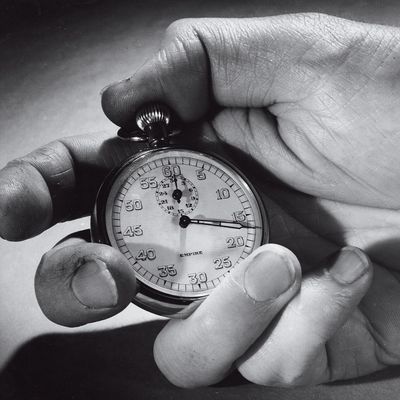
In 2012, Kanye West successfully halted the distribution of a sex tape reportedly depicting him in flagrante with a Kim Kardashian look-alike. Instead, TMZ described the two versions its editors had seen: “Both tapes are impressively long — the first is roughly 20 minutes and the second is more than 40. And we’re talking constant action. Seriously, the guy takes no breaks. It’s incredible. Almost Sting-like.” I sent the link to two friends. The male friend replied in awe. The female replied with skepticism. “Even if that were possible, it’d be at least 20 minutes too much of sex.”
How many minutes of sex is enough, and how many is too few? In public and pop culture, tales of sex that lasts all night long tend to draw low whistles and nods of approval. (“We have sex like Kenyan marathon runners,” Olivia Wilde once bragged of fiancé Jason Sudeikis.) Men’s and women’s magazines alike offer listicles on how to make sex last longer. (“Squeeze the base of his penis,” Cosmopolitan advises. “It quite literally stops him from ejaculating. Think of it like bending a hose in half to stop the flow of water.”) And in surveys, Americans of all ages and backgrounds report wanting sex that lasts longer than your average sitcom: When Fox News health pundit Keith Ablow surveyed fans in 2007, 80 percent of both men and women wanted sex to last half an hour. And yet, the actual duration of heterosexual intercourse tends to be pretty short: Most researchers agree that the average is something like six minutes. But every time I’ve repeated this fact to laymen, the reply, invariably, is “That’s all?”
Yes, that’s all. “That sucks,” the laymen say. But why? While plenty of sexual realities do, yes, suck, the near-universal assumption that brief sex is bad sex stuck out to me. Why is longevity viewed as an absolute value? When did we decide going longer was better, and has that changed how long we go when we do it?
As it turns out, even those six precious minutes may be more than our predecessors enjoyed. In his 1948 studies, Alfred Kinsey “found that 75 percent of American men orgasmed within two minutes of commencing intercourse,” Rachel Hills writes in her new book, The Sex Myth. “But more recent studies have reported a median time of between 5.4 and 7.5 minutes — suggesting that men may be adapting their sexual behavior to better fit the social ideal.” Today, she puts it wryly, “it is no longer acceptable for the sex act to end before one party has even begun.” We call that premature ejaculation and are terrified of it; back before Kinsey, “premature ejaculation” referred to men who came before their penises even touched the inside of a vagina. Only later did the term come to mean ejaculation that occurred earlier than desired. In the ’80s and ’90s, sexologists tried to define premature nut-busting according to number of thrusts — generally, eight to 15 — but have since switched to minutes.
What’s changed? The sexual revolution, for starters, which made female sexual pleasure a public goal for men for the first time. In 1970, Masters and Johnson boldly defined all heterosexual men who came before their partners more than 50 percent of the time premature ejaculators. Modern doctors tend to be less doctrinaire about who must orgasm when, but they do agree on some rules of thumb. According to a 2008 survey of sex therapists, sex is “too short” when it lasts one to two minutes. “Adequate” is three to seven minutes, and “desirable” is seven to 13. The range for “too long” went up to 30 minutes. Anything longer, like “more than 40,” will henceforth be known as “too Kanye.”
So why do we expect hour-long sex, when anything longer than ten minutes is a statistical anomaly? Some of the confusion about how long sex should last derives from the nebulous way we conceive of the act. The vast majority of data on the subject measures something wonkily called “intravaginal ejaculatory latency time,” defined as the time between the moment an erect penis enters a vagina and the moment that penis begins to come. This view of sex is, of course, hopelessly mechanical, not to mention penis-centric, and has little to do with the way people actually fuck. But then, how do you define the beginning and end of sex? Does it begin when one partner becomes aroused? When genitals are touched? What about those fabled women who can orgasm just with their nipples? Critiquing a series of scientific studies, the lesbian-feminist scholar Marilyn Frye estimated in 1992 that what straight couples do for eight minutes at a time with high frequency, lesbians do “considerably less frequently [and] takes, on average, considerably more than eight minutes to do. Maybe about 30 minutes at least. Sometimes maybe about an hour.” (Gay men in relationships report ejaculatory issues at the same rate as heterosexual men, but how long they’re actually doing it for is unknown; data on the duration of non-hetero sex remains frustratingly behind the times.)
But even with a more expansive definition of sex, couples seem perpetually disappointed. In 2012, a team of researchers from the University of New Brunswick took the bold step of measuring the duration of not just IELT but also foreplay. The study asked men and women in relationships to report how long an ideal foreplay session should last as well as ideal intercourse. Then they timed their actual sex lives in the comfort of their own bedrooms. (Or bathrooms, or kitchens, or backseats of cars. They weren’t required to specify.) They reported an average of 11 to 13 minutes of foreplay, and seven to eight minutes of intercourse. (Even though they were describing the exact same encounters, the men consistently reported both acts as lasting a minute or two longer than their partners did.) But everyone — male and female — wanted the entire encounter to be roughly double the length it was. Women wanted eight more minutes of foreplay and seven more minutes of intercourse; men wanted five more minutes of foreplay and 11 more minutes of sex. Which confused me: I can understand why reality might not meet expectations during vaginal intercourse, but foreplay has no physical constraint. If everyone wants five to seven more minutes of fooling around, then why don’t they just, you know, do it?
“Stupidity?” offered Eric Corty, the Penn State Erie professor who polled sex therapists about ideal duration. Or perhaps it’s an issue of logistics: “People are very poor sexual communicators,” offered E. Sandra Byers, the psychologist who co-helmed the foreplay study. And then there’s the “time-dilation effect,” as one of my straight male friends calls it. “Sometimes I’ll think we’ve been fucking for an hour, and then I’ll look at the clock and it’s only been 15 minutes.”
But could it be that people don’t actually want more sex? Maybe when they are not actively having it, they overestimate how much they want — the same way I buy too much food when I grocery-shop on an empty stomach. “Also, it could be a socially desirable option to the answer,” Corty noted. That is, people saying what they think they’re supposed to say — or supposed to want. Social expectations play a role, Corty said, “even in an anonymous survey.”
How did we get to the point of wanting longer sex in the abstract but never really acting on it IRL? According to Rachel Hills, today’s sexual expectations are tied to a myth that sex is “more special, more significant, a source of greater thrills and more perfect pleasure than any other activity humans engage in.” If good sex is necessary for self-actualization, the logic goes, then more sex will push us even higher. Thus, women feel compelled to declare themselves multi-orgasmic nymphomaniacs; men feel compelled to go harder and last longer. But whether this attitude has actually altered sexual behavior and stamina, as Mills argues, is debatable. When I asked Marcel D. Waldinger, a Dutch neuropsychiatrist affiliated with Drexel University, he was skeptical. He pointed to a 1943 study from the German researcher Bernhard Schapiro that suggests there were as many men back then on the “ultrarapid” end of the spectrum — one minute or less — as there are today. So maybe we’re all overthinking this. As Byers points out, people tend to want more time not just for sex but for everything they enjoy — or think they ought to enjoy. “If you give me a questionnaire that says ‘Would you like to visit your granddaughter more?’ I would say yes. If you said ‘How do you plan to fit that into your life?’ — that’s a different question.”
*This article appears in the September 21, 2015 issue of New York Magazine.




